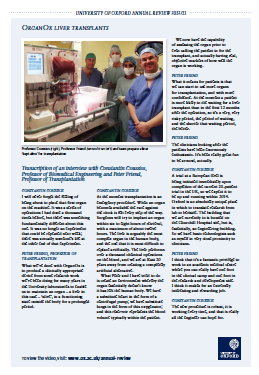New Research Fellowships with Birmingham Children's Hospital
A new research fellowship scheme enables surgeons to focus on research - and promises real improvements in patient safety and theatre outcomes.
 The Fellowship is offered by Birmingham Children's Hospital in partnership with the Department for Continuing Education's MSc in Surgical Science and Practice team. Mr Liam McCarthy, Consultant Paediatric Urologist and Transplant Surgeon at Birmingham Childrens Hospital NHS Foundation Trust, developed the Fellowship in 2013 for the purpose of providing opportunities for surgical trainees to experience a greater depth of scientific training, enhancing their current training model.
The Fellowship is offered by Birmingham Children's Hospital in partnership with the Department for Continuing Education's MSc in Surgical Science and Practice team. Mr Liam McCarthy, Consultant Paediatric Urologist and Transplant Surgeon at Birmingham Childrens Hospital NHS Foundation Trust, developed the Fellowship in 2013 for the purpose of providing opportunities for surgical trainees to experience a greater depth of scientific training, enhancing their current training model.
Liam said: 'I felt that the trainees would benefit from an alternative perspective, helping them to change the way they think and give them an opportunity to develop scientific approaches to decision making - develop a more questioning approach. I was particularly keen to encourage trainees to get used to framing and answering scientific questions as part of their general approach to problem solving.'
The first fellow
The first fellow, Jon Wells, was recruited in 2013 to try out the fellowship scheme. Jon was excited by the opportunity to develop his own research interests, as well as explore new fields. With the support of his Birmingham supervisor, Ingo Jester, Jon has been able to build on his studies, particularly of Human Factors and Patient Safety, to set up new research projects and collaborations. Jon's dissertation project 'Predictive value of urinary intestinal fatty acid binding protein in preterm infants at risk of developing necrotising enterocolitis' is a collaboration with Birmingham Women's Hospital and the University of Groningen in the Netherlands. Jon said:
'The MSc in Surgical Science and Practice has effectively introduced me to the science behind analysing what is done in theatre, and enabled me to pick up a range of collaborative research projects with a national and international group of researchers.'
Jon and Ingo have also developed a collaboration with Loughborough University, hosting undergraduate students at BCH. They looked for a source of expertise local to Birmingham in Human Factors, and Loughborough have experience of working with NHS Trusts. The first student started a 6-week placement in February 2015. Linked with Jon's other human factors projects, the student is applying human factors science to observations of surgical teams' pre-surgery team briefings, and post-surgery debriefs. Jon and Ingo hope that this work will ultimately lead to improvements in information-flow between team members and therefore better surgical outcomes for patients.
Jon and Ingo both felt that this collaboration would not have occurred without the opportunities provided by the Fellowship. Ingo said,'The Fellowship has been a very valuable experience both for the Fellow and me as a supervisor. In particular it has given the Fellow time to focus on developing their research skills, and as a result also enabled me to reinvest time in my own research.'
To read more about Jon's story please visit his Student Spotlight page.
Creating the fellowship
Liam McCarthy was interested in developing both the research and clinical capabilities of his department. Following recommendations from Liam, the Birmingham Trust increased its number of registrars from eight to thirteen. Paired with eleven consultants, the Trust thereby had two additional registrars who had the time to focus on research training and were employed as Research Fellows.
Liam was keen for the Fellows to focus on research in science generally, rather than just medicine or surgery. Liam and his colleagues reviewed the available Master's programmes and decided that Oxford's part-time MSc in Surgical Science and Practice was the most relevant.
They then discussed the possibility of a Fellow taking all the modules in one year (normally spread over two years) with Oxford, to facilitate the Fellowship model developing at the Hospital.
Research Fellowship posts are designed for people part-way through their Higher Surgical training. The Trust pays the research fellows two spine points less than other trainees, but contributes £10,000 towards the fees.
The Trust places a national advert on NHS jobs for each fellowship opportunity, once or twice a year. There is a two-stage appointment process - trainees must first apply to Oxford for the MSc in Surgical Science and Practice, and then if they are accepted attend a second stage interview with the Trust
For further information:
To discuss ways of implementing the Fellowship scheme in your institution please contact Liz SandersorAdrian Stokes.
Published 26 May 2015
